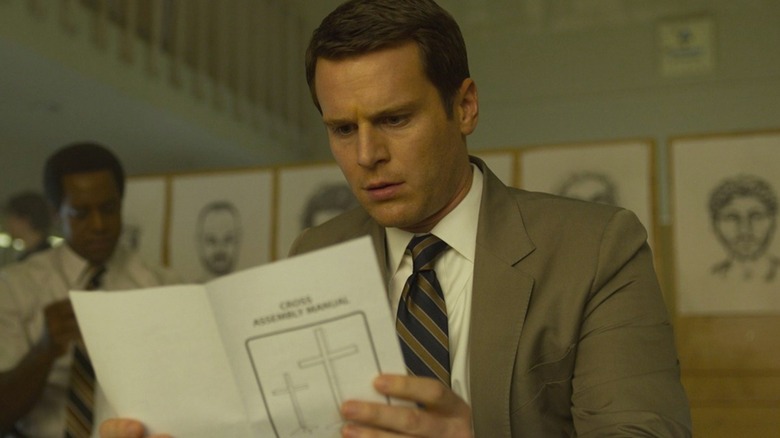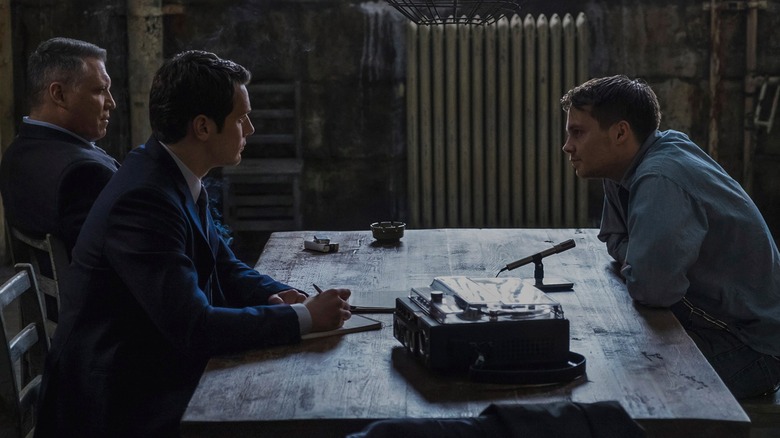One Of Netflix's Best Crime Shows Was Originally Set Up At HBO
An intriguing David Fincher project was announced at the start of the year 2010. Fincher, alongside Charlize Theron, was poised to adapt John Douglas and Mark Olshaker's "Mind Hunter: Inside the FBI's Elite Serial Crime Unit," the acclaimed crime book that aided real-life FBI investigations of serial killers. All the pieces of the puzzle were in place: Fincher was set to direct, Theron and co. would produce, and Scott Buck (who executive-produced Showtime's "Dexter") would write the pilot. This project, initially dubbed "Mind Hunter," was meant for HBO and Fox 21 (who had optioned the book at the time). Many routine changes occurred since then, and five years later, the retitled "Mindhunter" was moved to Netflix instead, with Fox 21 dropping out due to unforeseen reasons.
Some of the changes that occurred in the streaming sphere between 2010 and 2015 contributed to the crime show's move from HBO to Netflix. When the project was first announced, Fincher had mostly worked as a filmmaker, where his artistic proclivities (that birthed the likes of "Se7en" and "Zodiac") made him a perfect fit for adapting Douglas and Olshaker's non-fiction source material. This also meant that the realm of television was somewhat foreign to Fincher, but his steady involvement with "House of Cards" made him feel more comfortable with the medium over the years. This, combined with Netflix's unprecedented hold over the streaming landscape, might've led to the shift — the rest is history, even if it is an abruptly halted one.
You see, Netflix put the third season of "Mindhunter" on indefinite hold in 2020 (incurring the wrath of everyone, including me), with Fincher confirming that the series was officially over three years later. Well, there might be a tiiiiiny sliver of hope in the form of three tentatively planned "Mindhunter" movies, but this initiative isn't set in stone, so don't get your hopes up. Instead, let's do the next best thing by taking a trip down memory lane and revisiting the aspects that make "Mindhunter" special.
Mindhunter is more than a product of the true crime boom
There's a kernel of fascination embedded in the true crime genre, which explains why droves of audiences are drawn to the dramatization of these morbid stories (which are often exploited without tact or empathy). While some choice examples of well-crafted genre stories exist (such as Netflix's brilliant "Adolescence"), "Mindhunter" has always been a cut above the rest. The two-season show is thorough and addictive in its examination of the aberrant human psyche, and that of those who hunt and profile serial killers.
More importantly, Fincher's adaptation dramatizes these real-life FBI interrogations without sensationalizing them. Instead, the show is about the professionals who subject themselves to these difficult (often traumatizing) conversations, where empathy has to be faked to garner a deeper understanding of the mind of a killer.
Apart from being primarily character-driven, " Mindhunter" has a distinct look and feel, which cinematographer Erik Messerschmidt helped bring to life as per Fincher's preferred parameters. No handhelds or Steadicams were used (except for a few instances) because most of the interrogation/interview sequences demanded long, controlled shots that had to be meticulously mapped out to evoke the intended effect. Messerschmidt explained this process in great detail in an interview with Definition:
"Most of the drama in 'Mindhunter' comes from the characters' experiences in very long and complex interview scenes. The content of those scenes is extremely measured and nuanced, and I think a moving or shaking camera would have been a very distracting way to tell such a complex story [...] It's a beautiful thing to watch [...] David Fincher is absolutely a filmmaker who uses technology to his advantage. That said, it's not about toys, it's all story and project-based."
Had Fincher and co. moved forward with "Mindhunter" on HBO, the show might've looked markedly different, as the circumstances surrounding production would've inevitably shaped its contents. While the move to Netflix seems to have worked in the show's favor (with Fincher confidently experimenting with the medium), the unceremonious end of "Mindhunter" feels like a tragic loss. Few true crime-inspired stories have captured the complexity of human behavior like this now-canceled Netflix show, whose intrigue unravels over the seasons while keeping you hooked to its central characters. The fact that this astounding story never got the chance to end on its own terms is deeply unfortunate.

